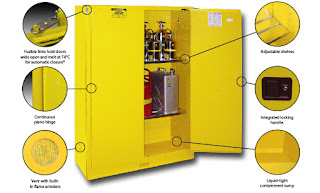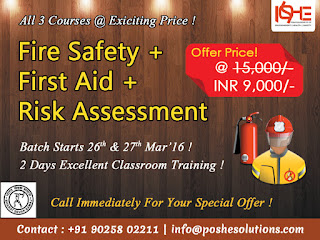When considering the storage or use of flammable liquids, the follwing safety principles should be applied:
V - Ventilation - Plenty of Fresh Air
I - Ignition - Control of Ignition Sources
C - Containment - Suitable Containers and Spillage Control
E - Exchange - try to use a less flammable product to do task
S - Separation - Keep storage away from process areas, by distance or a physical barrier, For example, a Wall or Partition.
Storage in the Workplace
Control Measures for Storage in the Workplace:
Storage in Open Air
Control Measures for Storage in the Open Air:
V - Ventilation - Plenty of Fresh Air
I - Ignition - Control of Ignition Sources
C - Containment - Suitable Containers and Spillage Control
E - Exchange - try to use a less flammable product to do task
S - Separation - Keep storage away from process areas, by distance or a physical barrier, For example, a Wall or Partition.
Storage in the Workplace
Control Measures for Storage in the Workplace:
- In a suitable container, to prevent spills and sealed to prevent loss of vapour
- In a suitable cabinet, bin or other store container
- In a designated area of the workplace
- Away from ignition sources, working oa process areas
- Capable of containing any spillage
- Provided with hazards warning signs to illustrate the flammability of the contents
- Prohibition signs for smoking and naked flame
- Not contain other substances or items
Storage in Open Air
Control Measures for Storage in the Open Air:
- Formal storage area on a concrete pad, with a sump for spills
- Bunded all around to take content of largest drum plus an allowance of 10%
- Away from other buildings
- Secure fence and gate 2m high
- Marked by signs warning of flammability
- Signs prohibiting smoking or other naked flames
- Protection from sunlight
- If lighting is provided within store it must be flame proof
- Provision from spill containment materials
- Fire Extinguishers located nearby - consider powder type
- Full and Empty containers separated
- Clear Identification of contents







